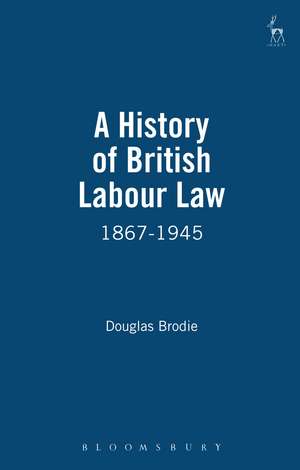A History of British Labour Law: 1867-1945
Autor Douglas Brodieen Limba Engleză Hardback – 16 sep 2003
Preț: 538.92 lei
Preț vechi: 773.19 lei
-30% Nou
Puncte Express: 808
Preț estimativ în valută:
103.13€ • 110.27$ • 85.98£
103.13€ • 110.27$ • 85.98£
Carte tipărită la comandă
Livrare economică 17 aprilie-01 mai
Preluare comenzi: 021 569.72.76
Specificații
ISBN-13: 9781841130156
ISBN-10: 184113015X
Pagini: 266
Dimensiuni: 138 x 216 x 21 mm
Greutate: 0.46 kg
Editura: Bloomsbury Publishing
Colecția Hart Publishing
Locul publicării:London, United Kingdom
ISBN-10: 184113015X
Pagini: 266
Dimensiuni: 138 x 216 x 21 mm
Greutate: 0.46 kg
Editura: Bloomsbury Publishing
Colecția Hart Publishing
Locul publicării:London, United Kingdom
Caracteristici
In the UK the received wisdom has tended to be that, historically, British labour law was abstentionist or non-interventionist. This work re-examines this interpretation by looking at the role given to law during its most formative period - 1867-1945.
Notă biografică
Douglas Brodie is a Reader in Law at the University of Edinburgh.
Cuprins
Introduction1. Labour Law 1867-18802. Labour Law 1880-19003. 1900-19144. Responding to Taff Vale5. The Impact of War 1914-186. The Aftermath of War 1918-217. Labour Law Between the Wars8. The Impact of the Second World War9. Concluding Remarks
Recenzii
Brodie's book covers more than just the 1906 Act and the experiences of the two world wars.It is a detailed elaboration of the provisions of the law since 1871 until 1945, and deals not only with collective bargaining, but also legal regulation of conditions of employment.
Brodie's coverage of the period is much wider than simply an analysis of trade union law and industrial conflict.There is much more besides.Brodie's book sheds new light and provides a different perspective to a critical period in the development of British labour law.the way he approaches the subject and his willingness to challenge previous orthodoxies make this an important work. It should be read by anyone who has wondered why the shape of British labour law is so different in important aspects from that of other developed countries.
This is a timely and useful book... confronts the formative history of our labour law with an honest determination. In educational terms, it is far more important that a labour law student should read this book than that he or she should know the latest tribunal decision on unfair dismissal.
One important issue which attracts much academic interest is the question of the 'national character' of a labour law system its origins, strengths and weaknesses. Douglas Brodie's account of the historical foundations of British labour law is important for re-opening the debate about the nature and achievements of that system.
Brodie's coverage of the period is much wider than simply an analysis of trade union law and industrial conflict.There is much more besides.Brodie's book sheds new light and provides a different perspective to a critical period in the development of British labour law.the way he approaches the subject and his willingness to challenge previous orthodoxies make this an important work. It should be read by anyone who has wondered why the shape of British labour law is so different in important aspects from that of other developed countries.
This is a timely and useful book... confronts the formative history of our labour law with an honest determination. In educational terms, it is far more important that a labour law student should read this book than that he or she should know the latest tribunal decision on unfair dismissal.
One important issue which attracts much academic interest is the question of the 'national character' of a labour law system its origins, strengths and weaknesses. Douglas Brodie's account of the historical foundations of British labour law is important for re-opening the debate about the nature and achievements of that system.
Descriere
This work examines the received wisdom that, British labour law was abstentionist or non-interventionist, by looking at the role given to law.
